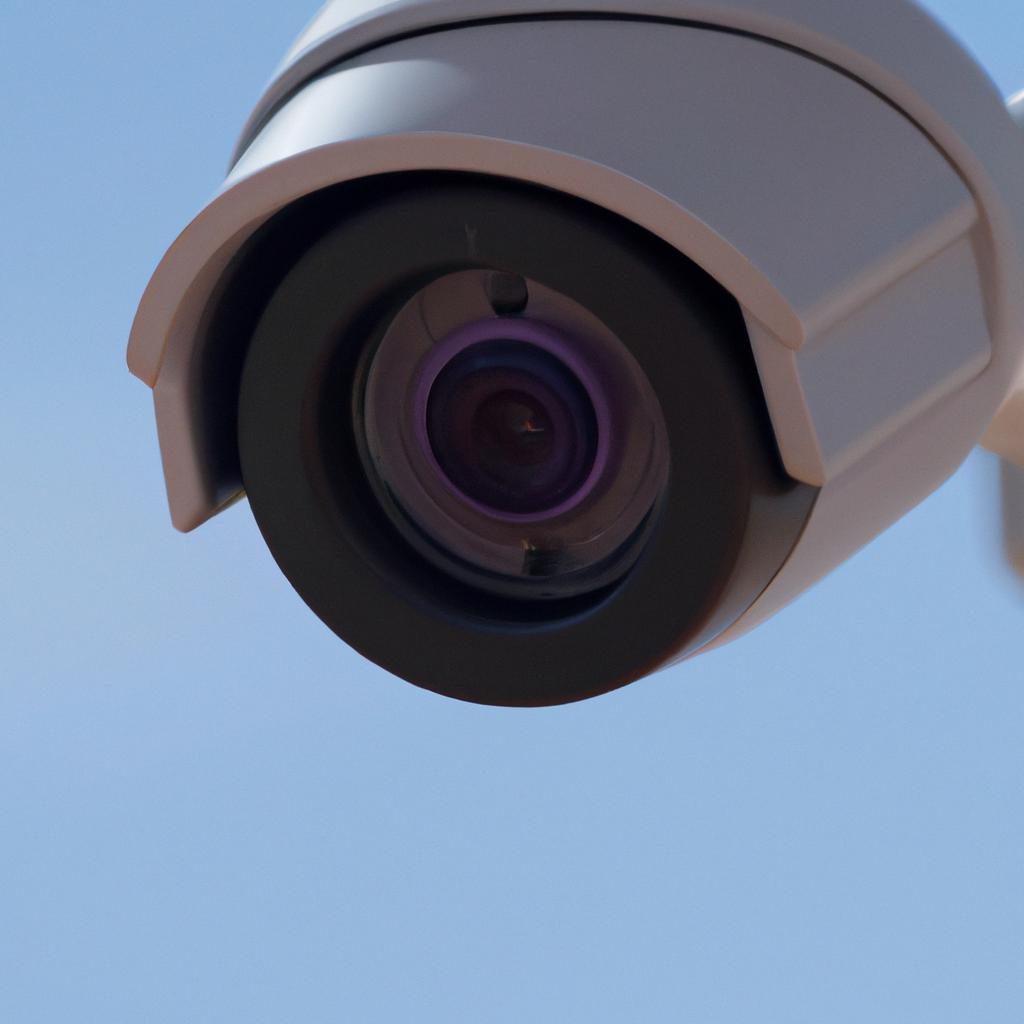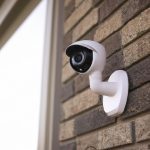Introduction

In a world where security concerns are on the rise, safeguarding our homes has become a top priority. After all, our homes are our sanctuaries, where we seek solace and create cherished memories. But how can we ensure the safety of our haven? The answer lies in investing in a good home security system that offers comprehensive protection tailored to your specific needs.
Importance of a Good Home Security System
Imagine having peace of mind, knowing that your home is shielded against potential threats. A good home security system acts as a vigilant guardian, deterring burglars and providing prompt alerts in case of any suspicious activity. It not only protects your valuable possessions but also safeguards the well-being of your loved ones.
Benefits of Having a Reliable Security System at Home
- Deterrence: A visible security system serves as a deterrent, preventing potential intruders from targeting your home. The mere presence of surveillance cameras, alarm systems, and motion sensors sends a clear message that your home is protected.
- Remote Monitoring: With advanced technology, you can effortlessly monitor your home from anywhere in the world. Whether you’re at work, on vacation, or running errands, you can check the live feed from your security cameras and receive real-time notifications on your mobile device.
- Quick Emergency Response: In the unfortunate event of a break-in or emergency, a reliable home security system can swiftly alert the authorities, ensuring prompt response and minimizing potential damage.
- Insurance Benefits: Many insurance companies offer discounted premiums to homeowners with security systems installed. By investing in a good home security system, you not only protect your property but also enjoy financial benefits in the long run.
- Peace of Mind: Knowing that you’ve taken proactive steps to protect your home and loved ones brings immeasurable peace of mind. You can sleep soundly, travel worry-free, and focus on creating beautiful memories, free from constant security concerns.
When it comes to securing your home, compromise is not an option. A good home security system provides an essential layer of protection, ensuring your peace of mind and preserving the sanctity of your abode. In the following sections, we will delve deeper into the components, features, and installation aspects that will help you make an informed decision while choosing the perfect security system for your home.
Understanding the Components of a Good Home Security System
When it comes to selecting a good home security system, it’s crucial to understand the various components that work together to provide robust protection for your home. Let’s delve into the key elements that form the foundation of a reliable security system.
A. Surveillance Cameras
Surveillance cameras are the eyes of your home security system, providing round-the-clock monitoring and recording of activities within and around your property. Here are the different types of surveillance cameras to consider:
- Indoor Cameras: These cameras are designed to monitor the interior of your home. They are ideal for keeping an eye on entryways, hallways, and rooms, ensuring complete visibility and peace of mind.
- Outdoor Cameras: Outdoor cameras are specifically built to withstand harsh weather conditions while monitoring the exterior of your property. They deter potential intruders and capture any suspicious activity near your home, acting as a strong deterrent.
Placement and coverage considerations are crucial when it comes to maximizing the effectiveness of surveillance cameras. Strategically positioning cameras at entry points, vulnerable areas, and blind spots ensures comprehensive coverage and maximum visibility.
B. Alarm Systems
Alarm systems play a vital role in home security by alerting you and deterring intruders when a breach is detected. Consider the following types of alarm systems:
- Burglar Alarms: These alarms are triggered when unauthorized access is detected, such as a door or window being forcibly opened. They emit loud, attention-grabbing sounds to scare off intruders and alert you and your neighbors of a potential threat.
- Fire Alarms: Fire alarms are essential for safeguarding your home against fire hazards. They detect smoke or sudden increases in temperature and emit loud warnings, enabling you to take immediate action and evacuate if necessary.
When choosing an alarm system, ensure it offers features such as remote arming and disarming, customizable alarm codes, and compatibility with home automation systems for enhanced convenience and control.
C. Motion Sensors
Motion sensors act as a crucial layer of protection, detecting any movement within their range and triggering an alarm or alert. They significantly enhance the security of your home. Consider the following types of motion sensors:
- Passive Infrared (PIR) Sensors: PIR sensors detect changes in infrared energy, such as body heat and movement. They are commonly used indoors and are highly effective in detecting human presence.
- Microwave Sensors: Microwave sensors emit continuous waves and measure reflections to detect motion. They are ideal for outdoor use and can cover larger areas.
Motion sensors are typically placed in key areas, such as entryways, hallways, and rooms. They provide an additional layer of security by detecting unauthorized movement and triggering immediate alerts or activating surveillance cameras.
Understanding the components of a good home security system is essential in making informed decisions while selecting the right system for your needs. In the following sections, we will explore the factors to consider, top features to look for, and installation aspects that will further guide you towards finding the perfect home security system.
Factors to Consider when Choosing a Good Home Security System
When it comes to choosing a good home security system, it’s crucial to consider various factors to ensure you select the best option that suits your specific needs. Let’s explore some key considerations that will guide you in making an informed decision.
Budget Considerations
Before diving into the world of home security systems, it’s essential to determine your budget. Security systems range in price, and understanding your financial limitations will help you narrow down your options. Remember, while it’s important to find an affordable solution, compromising on quality and reliability may leave you vulnerable in the long run. Consider a system that strikes the right balance between cost-effectiveness and robust security features.
Scalability and Expandability Options
As your needs evolve over time, it’s vital to choose a home security system that offers scalability and expandability. A good system should have the flexibility to adapt to your changing requirements. Whether you plan to add more surveillance cameras, incorporate additional sensors, or integrate with other smart home devices, ensure that your chosen security system can accommodate future expansions seamlessly.
Integration with Other Smart Home Devices
Smart home technology has revolutionized the way we live, providing convenience and control at our fingertips. When selecting a home security system, consider its compatibility with other smart devices you may already have or plan to incorporate in the future. Integration with devices such as smart locks, lighting systems, and voice assistants can enhance the overall security and functionality of your home.
Monitoring Options and Reliability
The effectiveness of a home security system lies in its monitoring capabilities and reliability. Look for systems that offer multiple monitoring options, such as professional monitoring services or self-monitoring through mobile apps. Professional monitoring ensures that trained experts are watching over your home 24/7, ready to respond to any emergencies. On the other hand, self-monitoring provides you with the flexibility to stay in control and receive instant notifications directly to your phone. Whichever option you choose, prioritize reliability to ensure uninterrupted protection for your home.
By considering these factors during your selection process, you can find a good home security system that aligns with your budget, offers room for future growth, integrates seamlessly with your smart home devices, and provides reliable monitoring options. In the next section, we will explore the top features that you should look for in a good home security system.
Top Features to Look for in a Good Home Security System
When considering a good home security system, it’s essential to understand the key features that make it effective in providing comprehensive protection. Here are the top features to look for:
A. Remote Access and Mobile App Control
In today’s digital age, the ability to remotely access and control your home security system is crucial. Look for a system that offers a user-friendly mobile app, allowing you to monitor your surveillance cameras, arm/disarm your alarm system, and receive notifications directly on your smartphone or tablet. With remote access, you can stay connected and in control, no matter where you are.
B. Real-time Alerts and Notifications
Timely information is vital when it comes to protecting your home. Look for a security system that offers real-time alerts and notifications. Whether it’s a triggered alarm, motion detection, or a door/window breach, receiving instant alerts ensures you can take immediate action or alert the authorities promptly.
C. Video Monitoring and Recording
Video monitoring is a powerful feature that enhances your home security system. Opt for surveillance cameras that offer high-definition video quality and a wide viewing angle. Additionally, look for systems that provide video recording capabilities, allowing you to review footage later if needed. The ability to monitor and record video footage provides valuable evidence in the event of a security breach.
D. Home Automation Integration
Integrating your home security system with home automation technology offers added convenience and control. Look for systems that seamlessly integrate with smart home devices, such as smart locks, lighting controls, and thermostats. This integration allows you to automate tasks, customize settings, and create personalized routines that enhance both security and comfort.
E. Emergency Response and Professional Monitoring
Consider a security system that offers professional monitoring services. With professional monitoring, a team of trained experts is available 24/7 to monitor your home for any security breaches. In the event of an emergency, they can quickly assess the situation and contact the appropriate authorities on your behalf, ensuring a swift response when you need it most.
By prioritizing these top features in your search for a good home security system, you can ensure that your investment provides you with the utmost protection and peace of mind. Remember, each feature plays a critical role in enhancing the overall security of your home, so carefully evaluate your options before making a decision.
Installation and Maintenance of a Good Home Security System
Securing your home with a reliable security system is just the first step towards ensuring ultimate protection. Proper installation and regular maintenance are crucial to maximize the effectiveness of your home security system. In this section, we will explore the different installation options, offer valuable tips for a seamless setup, and emphasize the importance of ongoing maintenance and system updates.
DIY vs. Professional Installation
When it comes to installing a home security system, you have two primary options: DIY installation or professional installation.
- DIY Installation: DIY installation is an attractive option for those who enjoy a hands-on approach and have a basic understanding of technology. With DIY installation, you have the flexibility to choose the components, customize the system according to your needs, and save on installation costs. However, it’s essential to carefully follow the manufacturer’s instructions and ensure proper placement and configuration of each component to guarantee optimal performance.
- Professional Installation: On the other hand, professional installation offers convenience, expertise, and peace of mind. Experienced technicians will assess your home’s unique layout, strategically position cameras and sensors, and integrate the system seamlessly with your existing infrastructure. Professional installation ensures that every component is correctly installed and connected, leaving no room for error. While it may incur additional costs, the expertise and reliability provided by professional installation are invaluable.
Tips for Proper Installation
Whether you opt for DIY installation or professional assistance, here are some essential tips to ensure a successful installation:
- Strategic Placement: Proper placement of surveillance cameras, motion sensors, and alarm systems is crucial for comprehensive coverage. Identify vulnerable areas such as entry points, windows, and blind spots to determine the optimal locations for each component.
- Secure Mounting: Ensure that all devices are securely mounted to prevent tampering or theft. Use appropriate mounting hardware for outdoor cameras to withstand weather conditions.
- Test and Configure: After installation, thoroughly test each component to ensure they are functioning correctly. Configure the system settings, including motion sensitivity, notification preferences, and password protection, according to your preferences.
Regular Maintenance and System Updates
To maintain the efficiency and reliability of your home security system, regular maintenance and system updates are essential. Here’s why:
- Routine Check-ups: Schedule periodic check-ups to inspect and clean your surveillance cameras, motion sensors, and alarm systems. Remove any obstructions that might hinder their functionality, such as dust, debris, or foliage.
- Battery Replacement: Replace batteries in wireless devices as needed to ensure uninterrupted operation. Keep track of battery life and replace them proactively to avoid any downtime.
- Software Updates: Stay up-to-date with the latest firmware and software updates provided by the manufacturer. These updates often include bug fixes, security patches, and performance enhancements.
By following these installation tips and adopting a proactive approach to maintenance and updates, you can ensure that your home security system remains in optimal condition, effectively safeguarding your home and loved ones.
In the next section, we will explore the key features to look for in a good home security system, empowering you to make an informed choice that aligns with your specific security needs.
Conclusion
In conclusion, investing in a good home security system is an integral step towards ensuring the utmost protection for your home and loved ones. With the increasing prevalence of security threats, it has become crucial to fortify our homes against potential intrusions and emergencies.
By understanding the importance of a good home security system, we recognize its role in deterring criminals, providing remote monitoring capabilities, and facilitating quick emergency response. The benefits of having a reliable security system extend beyond safeguarding your property; they grant you peace of mind, save you money on insurance premiums, and allow you to focus on what truly matters – creating cherished memories within the sanctuary of your home.
When selecting a security system, consider the components such as surveillance cameras, alarm systems, and motion sensors, ensuring comprehensive coverage of your property. Look for features like remote access, real-time alerts, and video monitoring that enhance the system’s functionality and convenience. Moreover, prioritize scalability, integration with other smart home devices, and reliable monitoring options.
Installation and maintenance are crucial aspects to ensure the effective operation of your security system. Choose between professional installation or a DIY approach, keeping in mind the complexity of the system and your own capabilities. Additionally, regular maintenance and system updates are essential to keep the system functioning optimally.
In conclusion, a good home security system is an investment that provides invaluable protection, peace of mind, and a sense of security for you and your loved ones. Choose wisely, considering your specific needs and budget, and make an informed decision that ensures the ultimate protection for your home.
Remember, at erp.nganhangviet.org, we prioritize your safety and well-being. Explore our range of good home security systems, designed to meet the highest standards of quality and reliability. Safeguard your home today and enjoy the tranquility that comes with a secure haven.

